Theatre Reviews
THE CANTERVILLE GHOST: THE MUSICAL - Magpie Theatre
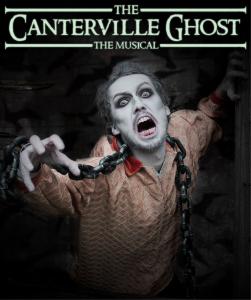
Arriving at the United Reformed Church on a wet afternoon, and greeted by costumed and heavily made-up cast members, I wondered what I was in for as I attended Magpie Theatre’s adaptation of Oscar Wilde’s story The Canterville Ghost. And then, as I sat down, the music started up and I realized I was in for something quite special.
What we have here is a full-scale musical, fueled by a memorable score, complicated songs, wit and energy, staged in the simplest manner but with focus and commitment by all involved. The ghost of Sir Simon de Canterville has haunted his manor for centuries, but the arrival of a family of pragmatic Americans causes a culture clash between the physical and spirit realms. It’s a story that might have been the inspiration of Tim Burton’s classic Beetlejuice, and in the central performance of Jack Gloyens of Sir Simon, all white faced, long-limbed flamboyance, there’s a hint of one of Burton’s other creations, The Nightmare Before Christmas’s hero, Jack Skellington. Also, for all his energetic humour, there’s a well of sadness and regret which Gloyens conveys well throughout.
The cast is uniformly strong, with stand-outs for me being Frankie Fleming as Virginia, the daughter of the family, torn between tradition and modernity, and Lizzy Paes, who has some wonderfully slapstick moments as Mrs Umney, the housekeeper.
Star of this show, though is the music – David Jones’ songs are catchy but complicated (by the end we are treated to five-part harmonies) and all performed completely live – the musical accompaniment by Will Truby on the piano is a highlight in its own right. I also loved the way the sound effects were performed live. Perhaps in the slightly echoey acoustic of the URC at times the piano drowned out the vocals and some of the witty lyrics were lost, but this in no way reduced the pleasure in this ambitious and entirely satisfying new musical for all the family.
Robbie Carnegie
GOODBYE UNCLE FUDGEY - Tom Greaves
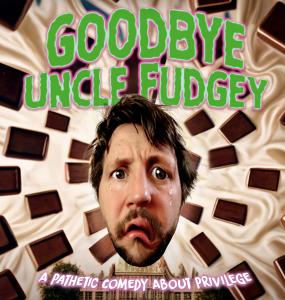
As we wait for the show to start we notice a duvet on a bed. It twitches – there’s someone under it. He pokes his head out, takes pot shots at the audience with a pea-shooter, wriggles his way towards the front row to take better aim.
He engages a bit with the audience in the persona of a 7-year-old (asked this reviewer why he looked so grumpy!), then is ordered back to bed by the stage manager from behind us, and to get on with the show proper. “You’re wasting time, we’re running late now!” That’s the first of two or three interchanges between actor and tech team behind us and that maintains the right tone of what could otherwise have been a more intense and disturbing piece.
Tom Greaves goes a great job in portraying the young boy, growing up through boarding school, and his dominating father whose one ambition in life is to be wealthy if not rich from his business and to gain approval from his peers.
The show as a whole can be seen as a psychological drama, at heart about the enduring damage that can be … is … done to children sent away from home to boarding school. In a sense, the core of it is so well expressed when the boy, a little later in life, asks “Did you send me away to boarding school for my good or for your own?”.
The many disturbing episodes of school and other life are acted out strongly by a performer whose vocal range and physical presence are convincing, and there are two video cartoons made for the show which help it along. It’s been reported that in making this show about trauma, vulnerability and harm, Greaves drew on his own experience of being sent away to boarding school. There’s a serious theme behind the show, but it is played with constant good humour and just a little audience engagement.
Michael Quine
A CARAVAN NAMED DESIRE - Split Infinitive
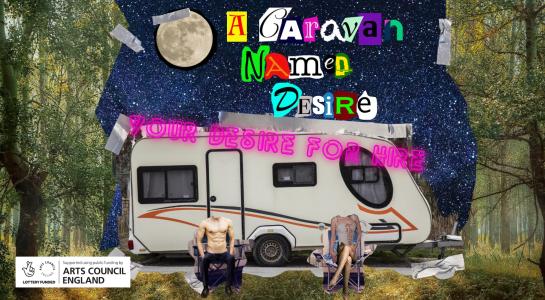
You might not guess it from the publicity but this is a play about sex. It is an imaginative and inventive two-handed play with Alex and Helen Millington.
The play is at first baffling as everything seems to be going wrong: from the music intro to the lead actress going missing – requiring Alex’s wife to stand in. Ostensibly the story features a playwright doing field research for a play about sex-workers but there are layers of tension below the surface. The part of the sex worker, Krystal, is taken by his wife. The part of his wife, Helen, is also taken by his wife. And hence is the main source of conflict within the play.
‘Gary’ (Alex) meets ‘Krystal’ but is shy and only goes as far as talking, it is the fourth visit before he kisses her. He is reticent about discussing what intimate activities he really wants and tells Krystal that he has erection problems, this is possibly to avoid further intimacy. His wife, also playing Krystal remember, is annoyed when told that he would rather admit to sexual dysfunction than to his being married to her.
It is difficult in a few sentences to give a clear description of how the play deconstructs itself but it was done ingeniously and unpredictably. There are many levels to this ‘play about writing a play’. The rapport flowing between Gary and Krystal (client /sex worker) and Alex and Helen (husband /wife) was played seamlessly and the - apparently - off-script dialogue where the actors discussed where this is going was convincingly done in side whispers.
There was some audience involvement, which involved one member slapping Gary across the face. The ending, which I won’t relate, was also unforeseen.
Two more chances to see on 22nd and 23rd July. If you enjoy adventurous, creative, challenging theatre don’t miss it.
Oh, a post script: the audience members called on-stage were given Krystal’s business cards: “Your desire for hire”. I called the number but I’m not telling.
Brian Kirman
UNWANTED OBJECTS - David Head & Matt Glover

A charming low-key show, perhaps more storytelling rather than the “Theatre” it is classified as. We have two performers, David Head, the core story-teller and Matt Glover, reprising/ reflecting in gentle song the stories we have heard while from time to time providing affable guitar background, never at all intrusive. The stories are lovely, and it’s plain that they have been crafted and developed with great care.
Some readers may remember Bagpuss, the short television series created by Peter Firmin and Oliver Postgate, based around objects brought in to an antique shop whose back story was then developed for young viewers. This show has something of the same starting point – a second-hand shop where the owner receives and holds on to items not for what they are but rather for the story that lies behind them. In a sense it’s the stories he collects rather than the items. In this show, we don’t see any of the items – a ship in a bottle, a family heirloom salt cellar, a teddy bear – but we hear the stories, the family histories he wanted them for. And it’s these stories that we are told, with warmth and affection, and the teddy bear’s in particular is told, affectingly, from the point of view of the bear over the whole life of its owner.
The stories themselves have elements of charm, of sadness, of warmth and of humour and there are some gentle puns in the writing – as indeed also in the guitar accompaniments, though, quite deliberately, nothing to generate a laugh-out-loud. We sit, we listen, we recognise …
This reviewer came away with a copy of the script since it felt likely that reading the text would give a deeper insight into – and memory of – the complexity of the tales being spoken on stage, where they would have benefitted from a stronger sense of presence and of performance.
Michael Quine
IT'S MY LIFE BY KATIE BELL - Grand Fromage

It’s My Life – a brand-new one-woman musical – tells the story of a 38-year-old divorcee and her search for self-discovery and love. Described in the blurb as ‘Shirley Valentine meets Alan Bennett’ it perhaps owes more to musical theatre song-cycles such as Andrew Lloyd Webber and Don Black’s Tell Me On A Sunday or James Robert Brown’s The Last Five Years, giving us, as it does, a window into one woman’s life through song.
Annie Wallen stars in this show, and is an attractive presence onstage, winning over the audience with a down-to-earth honesty. She also has a very musical vocal range, which covers the variety of songs well, whether emoting power ballads or kicking out up-beat dance numbers. At points I would have liked her sweet voice to have been a bit more rough around the edges, when conveying the pain and bitterness of her situation, and also it would be good if she sang in the same Yorkshire accent she speaks in (rather than the mid-Atlantic tones that the songs seem to encourage), both of which I’m sure this talented performer would be capable of.
Katie Bell’s writing touches on many themes of female empowerment, although I’d have liked to see a bit more of a trajectory through the show as our heroine gradually ‘finds herself’. The songs are enjoyable, especially when they convey a bit more light and shade – I especially liked the upbeat ‘red shoes’ number and the folk-song pastiche about her abusive relationship. The show often works best in its moments of stillness when the songs are performed in a natural way (while doing some kind of household task, or just sitting quietly), rather than straight out to the audience, reminding us that musical theatre is often about conveying emotions that can’t be put across through words alone.
Robbie Carnegie
DOUBLE BILL: TUESDAY AND RISK - Buxton Opera House Young Company

Buxton Opera House Young Company is for anyone local aged 6-19 with an interest in drama and stage craft. The Youth Company is part of the wider Platform 3 programme providing exciting opportunities for young people, schools and communities to take part in performing arts activities and projects across Buxton, the High Peak and beyond. This year the talented young team have produced two one act plays presented in the Pavilion Arts Centre on one evening.
The first, called Tuesday by Alison Carr, is about an ordinary day that transforms into an amazing adventure into the unknown. With a tilt to Lord of the Flies, in the absence of adults 14 pupils from fictitious Lane End School face fears, choices and consequences, leading to discovering that only by working together can they resolve their problem and return to the familiar with a new perspective. The group’s performance drew the audience into their experience and the well rehearsed choreography worked well with the minimal set.
After the interval a second group brought Risk by John Retallack to the stage. Seven young actors, four cubes and a collection of transparent brollies offer a series of interwoven stories about taking risks in life, the lessons experience can teach us if we are open to learning, and the value and price of vulnerability from teenager’s perspectives. The stories included examples of bullying, drugs and alcohol, LGBQT+, parenting, clubbing, acceptance, snobbery, pride, eating disorders, and speaking up for yourself – all weighty topics handled with impressive maturity by the young cast.
Both pieces were new writing brought to life on stage with passion, skill and emerging talents including the lighting and tech thanks to the Platform 3 programme. It is encouraging, indeed heart warming, to see the next generation discovering the joy and reward of the performing arts. Whatever they each go on to do in life this is formative experience that will serve them well. Lets hope that funding to allow Buxton Opera House and others to offer this sort of experience will continue to be available. https://buxtonoperahouse.org.uk/learning-engagement/young-company
Jean Ball
SAINT GEORGE AND OTHER STORIES - Dylan Howells/Joe Sellman-Leava

Actor-writer Joe Sellman-Leava returns to Buxton garlanded with Fringe First awards for last year’s Fanboy and brings with him something simpler. This is an enjoyable 50 minutes of storytelling with Joe and fellow performer Dylan Howells each presenting a story that touches upon their past.
Dylan begins with a tale of his family, his eccentric brother, and a trip to Amsterdam. Dylan delivers this story in an unaffected, wryly sardonic style – in many respects it feels like something he would recite after a few drinks with friends.
Joe’s story, Saint George is the more polished of the two, although still a work in progress. It tells of childhood friendship, of unlikely alliances, of boys becoming men. Joe inhabits the various characters well and the story is a touchingly honest portrayal of a lost age.
The show could do with a stronger framing device to give the stories a unified structure that makes it more of a theatre piece rather than a spoken word recital, but there’s no doubt this agreeable show provides a relaxing oasis in the frenetic pace of the Buxton Fringe schedule.
Robbie Carnegie
STILL MAD ABOUT THE BOY?: 125 YEARS OF NOEL COWARD - Shows We Used To Know

Watching this show is like luxuriating in a warm bath*.
We heard songs and readings from the ‘Boy’s’ works; some familiar and some previously unperformed. This narrative biography of Noel Coward started with his auditioning days (with a pushy ‘stage mother’) which were related from his diaries with the wit we have come to know. It was suggested this early episode at age 11 inspired his well known, “Don’t Put Your Daughter on the Stage Mrs Worthington”. The young Noel was chosen as a ‘golden boy’, part of the chorus in a show called ‘Fish’. A goldfish - perhaps. And so his professional career began.
Robert Hazle and Helena Northcote presented material from the Coward archive, of which Robert is a curator. Their confident and enjoyable presentation was accompanied by Robert’s piano and we followed Noel’s career chronologically.
We were reminded, as if it was necessary, of just how witty Coward’s songs were with some philosophy thrown in, “Every peach out of reach is attractive...”. We learned of Cowards deep lasting friendships and with his lifelong friends and the ‘pals-pact’. He was friends with Ivor Novello and we were treated to Novello’s “And Mother Came, too” - also recently heard in the Opera House production “The land of Might have been”. "There is nothing more potent than cheap music."
The tone of the show changed slightly when we reached the war years and heard his emotional and sentimental song. ‘London Pride’ which is a celebration of the strength and determination of civilians during the London Blitz.
The audience loved the show and there is another performance on 21st July.
*Watching this show is like luxuriating in a warm bath - with a bottle of vintage Champagne at hand.
Brian Kirman
THINGS ARE LOOKING UP!: THE SONGS OF CICELY COURTNEIDGE - Shows We Used To Know

Robert Hazle and Helena Northcote proved a formidable double act as they brought to life the story of music hall singer and actor, Dame Cicely Courtneidge, who hailed from a theatrical family and whose career spanned two world wars.
With Robert at the URC’s restored Broadwood grand piano and Helena looking bright as a button in a nipped in at the waist purple dress with white spots, they took us through her life weaving biographical detail with carefully chosen songs from the era, the music of Noël Coward, Ivor Novello, Rodgers and Hart and George Gershwin all featuring.
Helena and Robert both sang beautifully and had an easy rapport with each other - they are a married couple. Whilst the atmosphere throughout was upbeat and the pace lively with a great many songs to enjoy, the pair did not shy away from telling us about the lows as well as the highs of her career. Cicely showed great resilience at times when she felt left out in the cold professionally, reinventing herself often enough to have a very enduring presence on stage, in film and on TV, even taking a role in the 1970s’ comedy series On the Buses. Helena had a few props and a range of accents that also helped her portray other characters along the way, even including gangster Al Capone at one point.
Songs such as the First World War number Take Me Back to Dear Old Blighty could not fail to move and there was also a tear in my eye when Helena recreated the occasion when peace was announced in 1945 while she was actually performing; a soldier came up on stage, whispered in her ear and draped her in a Union Jack flag.
At the end, the song Vitality from a medley of hits from Gay’s the Word, the musical written for Cicely by her friend Ivor Novello, stood out as a tribute to everything wonderful about the vivacious star. Robert and Helena are to be congratulated on their clever choice of music that really seemed to tell her story as well as the inclusion of one for-the-hell of it number that really didn’t: The Haggis Rag, adapted from The Tiger Rag and featuring some lovely Buxton references that added to the fun.
Further performances of this sunny entertainment take place 19-22nd July at 3pm at the United Reformed Church.
Stephanie Billen
NATION - PJV STUDIO

Peter Vickers returns to the Fringe after the success of ZAV at last year’s festival which won the New Writing award, and was nominated in both Production and Male Actor.
With his new play he has come up with 'another one of his idiots' as he describes it. Nation is a monologue from the point of view of an idiosyncratic Englishman adrift in Paris for a few months trying to earn enough to get by before he can move on to Barcelona. On first encountering him he seems like a naïve soul struggling in his job delivering print around Paris because of his 'lack of the French tongue', and because he likes to do things right 'like any decent human being', but we soon learn that this naivety is that of a man without self-awareness, but selfish and self-justifying.
This supposed innocence allows him to move through the key stories of the day while only really thinking of himself, and through him we see the city and its people. Via his obsession about being right, we see the great wrongs of society to which he seems oblivious. The action is centred around Place de la Nation where protests over the police shooting an Arab man are growing (an ironic coincidence given recent real-life events in Paris) and he encounters a cross-section of Parisian society, from the orange haired anarchist to the blue suited businessman, laced throughout with Vickers’ shrewd observation. As our protagonist’s life unspools and he gets mixed up with the low-life of the city the plot turns both sinister and comic.
As anyone who has seen ZAV last year or his Oscar Wilde Fairy Tales this year will recognise, Vickers’ movement is precise and allows for great characterisation. The production is simplicity itself, but he holds your attention throughout with his use of space, and for those tired of onstage mumbling, his clear diction is a joy.
This was the very first time Nation has been shown to anyone and while there was a mistake that omitted an important part of the tale, there is much to relish in this performance, and as it develops it has the potential to surpass ZAV as a piece of theatre. Once more Peter Vickers has brought a memorable character to the Green Man stage, one well worth watching.
Stephen Walker
ROOM - Emul8 Theatre Company/Sweet Productions

Virginia Woolf’s essay A Room of One’s Own, first published in 1929, is a plea for women’s self-expression in a time where such prospects were severely limited, based on the foundation that, ‘A woman must have money and a room of her own if she is to write fiction’.
Actor Heather Alexander takes on the seemingly impossible task of adapting an essay into an engrossing piece of theatre, and completely succeeds. A Room of One’s Own was originally delivered as a series of lectures and this helps to give the evening structure, but it is much more than that. Alexander’s Woolf is a fully rounded presence onstage, intellectual, patrician, but also questioning, yearning, looking for answers. She conveys her frustrations at the limitations society places on her (in the women’s college she attends, the facilities are so much less than those of her male counterparts), and explores with feeling the idea of what it would have been like if Shakespeare had had a sister, with the same gifts as him, but none of the advantages of being male. She also posits a situation where two female scientists ‘like’ each other – she entreats us not to be shocked by such a suggestion – and there’s something beautiful but also sad in this scenario and the impossibility of it.
Heather Alexander, under the direction of Dominique Gerrard, makes Woolf a living, breathing character in her own right. It is a performance of subtlety and skill, never histrionic or over-dramatic, entirely believable. And through subtle visual clues, we are reminded this is not just a period piece. Virginia is first depicted looking every inch the 1920s feminist (high wasted trousers, braces – the detail of the costume is just right), but as the play progresses, the braces come off, the shirt is untucked, and she now resembles a modern woman, reminding us that while it might be easy to think that the world has changed since Woolf’s time, for many women, economic and societal pressures mean that the opportunities she calls for are still a long way off.
Robbie Carnegie
GRIST TO THE MILL PRESENTS - Grist to the Mill Productions

Fresh from the Brighton Fringe, Grist to the Mill brings three separate performances, adapted and performed by Ross Ericson, to the Rotunda.
The run kicks off with Ericson’s ambitious adaption of Moby Dick.
His reworking of Herman Melville's classic tale of the hunt for the great white whale was created in 2019 to coincide with the bicentenary of Melville’s birth.
It is no mean feat adapting a 400-plus page novel to fit into a one hour show. But Ericson achieves it by jumping in on day one of Captain Ahab's hunt for the beast that took his leg, and hardly letting up the pace throughout the entire 60 minutes.
“Call me Ishmael... Now it was some years ago, never mind how long precisely, that I did take it into my head to go on a whaling voyage...”
With the stage set as a dockside tavern, he delivers his tale with passion and enthusiasm which is only slightly marred by some stumbling delivery of lines. These are quickly recovered and the small audience will him onwards towards the tragic conclusion of this seafaring yarn.
This was the only showing of Moby Dick at Buxton Fringe. On Tuesday Ericson is giving us The Unknown Soldier, which was a sell out at last year's Edinburgh Fringe, and on Wednesday, Gratiano, a sequel to Shakespeare's The Merchant of Venice. Both of these shows are at the Rotunda.
Carole Garner
SEVEN AND A HALF YEARS - MMGMUSIC PRODUCTIONS

Mark Glentworth was flying high, or so it appeared. He was a successful musician with a family, then he suffered a mental breakdown. Unable to cope with the Unit into which he was placed, he discharged himself, returned home, and holed himself up there, only emerging to go to the corner shop to buy a daily sandwich … for seven-and-a-half years.
Now having turned his life around, Mark has put his experiences into this autobiographical musical. In it, he explores the roots of his mental illness, the pressures he placed upon himself, the need to be regarded as a ‘hero’ by all around him. He also raises the question of what happens to the human body when you’ve had no fruit, veg or exercise for such an extended period of time.
It’s a brave undertaking and Mark Glentworth is to be commended for his courage in putting his experiences on stage. In the show there is a line from his father saying, ‘Why don’t you go back to your music? You were always happiest there.’ There’s no doubt that in the show, Mark is at his most comfortable when behind his keyboard, and his songs have a great deal of charm. When away from the security of the music he feels more exposed and not always comfortable, but one cannot fail to respect the truthfulness and sincerity of his story, played out in such a public arena.
Robbie Carnegie
STAR WARTS! - A NEW HIP - ReZolution Theatre Company

ReZolution Theatre Company return with their affectionate parody of Star Wars in a ‘play that goes wrong’ style. Star Warts! - A New Hip is a slightly reworked version from last year and includes some cast changes. It is devised and directed by the cast who all seem comfortable working and playing off each other.
A local group are doing a production in a church hall – introduced by the ever warm and reassuring Phil Coggins as the vicar – in desperate need of 50 pence to feed the electricity meter.
Maya Williams takes on the role of Luke and gives us a taste of some rather good singing and mop wielding dexterity. Oliver Moody inhibits ‘CBeebies’ (C3PO) and gives him a quirky physicality. with Tara Stadon competently taking on duel roles of Leia and Ben leaving Theo Spencer as Tarkin and Vader.
Obviously things do go wrong – whether it’s people not knowing their lines, props going astray and visibility of the chaos backstage. I really enjoyed the ‘blue milk and cereal’ scene which Maya and Oliver delivered with style and confidence, especially Maya playing multiple characters. Tara brought a great energy and frustration to the scene where she ended up swapping lines with Theo. But in both cases I felt repeating the same device later on diluted it. Use of props and puppets was fun and inventive and helped give it a ‘we’re putting on a show right here, right now’ feel.
To play bad, you have to be very good. And perhaps some of the cast were stronger at this than others. But it came together as a whole. There was an enthusiastic audience, clearly enjoying it and indeed there is much to enjoy.
Maria Carnegie
DARK HORSE: INSPIRED BY TENNESSEE WILLIAMS - Delila Theatre
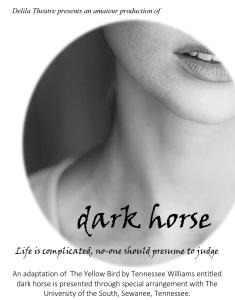
Dark Horse is based on Tennessee Williams' short story The Yellow Bird, adapted by Karran Collings in this premiere from Delila Theatre Company
Like many of Williams’ works there is a theme of an unmarried daughter approaching 25 and concerned about being left an old maid. The concern is her parents, especially her mother, she herself doesn’t seem bothered. What does bother her is the strict and limited childhood and teenage years she has had to endure with her preacher father and conformist mother. For example hiding the fact that she has started smoking – an act for which her father had threatened to denounce her to his congregation.
Eventually she rebels against her repressive family situation which has powerful consequences that occupy the rest of the play.
The theme is that while we are victims of our upbringing the choices we make have severe repercussions on our future lives. Like many of Tennessee William’s plays they are set in a specific region (the southern states of America) but resonate across borders and across geography.
A sharp interpretation and well acted.
Before the Williams play we had a monologue, written by the director which started with a group therapy idea (AA) and progressed through relationship issues to an analogy of the biblical Samson story.
A full programme in the new ‘Squeak’ Venue. I have to mention that even on a cool rainy day the Squeak tent became very sticky and humid which detracted somewhat from the dramas.
Two further performances 17th July.
Brian Kirman
97+ - Tom Cain Theatre
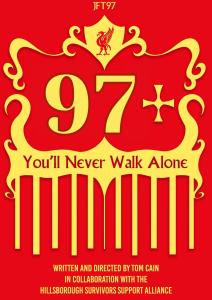
97+ was written by Tom Cain in 2021 in collaboration with The Hillsborough Survivors Support Alliance who are an all-inclusive group that provides support to anyone that has been affected by the events that took place at Hillsborough on April 15th 1989.
The play clearly sets out the background facts of the disaster for those who may not know them and brings the events up to the 12th of September 2012 when the truth finally began to feel closer. John and Steve take us through a range of emotions from desperation to hope and kindness.
Transitions are fluid between scenes and ensure the piece proceeds at a swift pace. Blocks were also used well to create the set.
John (Colin Kilbride) was played with honesty and showed a gentle man, hounded by night terrors but still able to love and connect with others. Steve’s spiralling life was skilfully characterised by Leslie Longley. These characters showed the audience a friendship born from a shared history. A friendship where men talk about how they feel and know that there are moments when you don’t want to talk. John’s wife Liz (Claudia Molyneaux) was played as a direct contrast to the men, someone who had no direct involvement with the event, but who was supporting her husband.
This was a big-hearted production, though occasionally there was too much exposition given and it lost the natural rhythm of speech. However, there were other moments that had the audience in tears.
This piece clearly shows how the ongoing trauma of the events affect different people in different ways, it isn’t just the official 97 figure or their families and friends. How many people have thought about those in the seated stand above, or their families and friends? It is important that these events are kept alive so that audiences understand the struggle for justice and inner peace.
Jayne Fanthorpe Walker
MAYBE DICK - Hambledon Productions
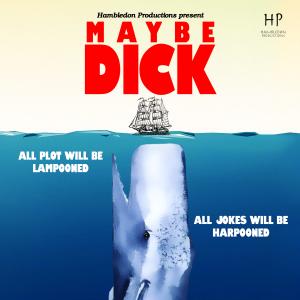
Is this drama – as you might expect from its source “Moby Dick”? Or is it subverted into comedy, as the title and blurb suggest?
Without doubt it’s the latter, the script rich with puns and comedy references. Rooted in the basics of the story and the well-known names/ characters, we have a very lively, very quick-witted script delivered by the talented John Hewer … if you miss one pun/ funny reference it’s a bit like the No 22 bus in London – there will be another one along in a moment. The show is inventive and very funny and goes along at a great pace.
Of course it’s not just a witty script, there’s an attractive and inventive set, and entertaining props along with perfectly timed and designed sound effects – and even a (puppet) duck which seems to have a life of its own. You certainly don’t need to be familiar with Herman Melville’s novel.
John Hewer who wrote this and performs wonderfully in it is also the performer in “Just Like That”, also at the Rotunda. In that, he’s the perfect Tommy Cooper reborn, and in this show, “Maybe Dick”, he gives a remarkably different, agile, inventive set of characters along with a high degree of physical comedy, not without the occasional nod to the audience who responded warmly. Bruce Knight’s sharp direction has a keen eye on what works for an audience and they make a great team.
Michael Quine
TWO BY JIM CARTWRIGHT - Buxton Drama League

Jim Cartwright’s play has been doing the rounds since its premier at the splendid Bolton Octagon in 1989. The drama takes place over an evening in a northern pub and there are a series of episodes with different characters, both humorous and poignant.
The Conservative Club back-room was sold out and the audience was part of the action as the principal characters collected glasses from our tables.
There was a series of humorous and heartbreaking monologues from archetype pub regulars: the old lady worn out from caring from her disabled husband, the flirty fiance talking his way out of trouble with his betrothed, the lonely widower reflecting on his life, an abused wife and behind all this was the landlord and landlady keeping continuity throughout the evening.
The play was written and presented with two actors playing all the roles. This was accomplished brilliantly by Corinne Coward and Andrew Freeman. It is a point of discussion whether the differing parts would be better played by multiple actors. Being an amateur company this would take a bit more organisation but not expense. Cartwright wrote this to have two actors play all the parts. But maybe he had a professional company, and costs, in mind. In any case TWO is a test of an actor's skill to slip between characters and our actors did this convincingly.
Although enjoying the visiting characters and monologues at some point I thought ‘this is all very entertaining but where is it going?’ This didn’t prepare me for the powerfully moving ending. There had been an understated tension between landlord and wife throughout their appearances and this came to an emotional and powerful climax to close the play.
More performances on 16th and 21st July, which will probably sell out, so book early.
Brian Kirman
FUGEE BY ABI MORGAN - Shadow Syndicate

Abi Morgan’s play Fugee was written in 2008 and sadly has lost none of its relevance in the ensuing years. It begins with a bang – a boy stands over the body of a man, a knife in his hand. The Prodigy blares out, screams rend the air. This is Kojo, a refugee from Cote d’Ivoire, and this is the story of how he got to this point.
Morgan employs a Brechtian device of having the actor turn to the audience and tell them that he is an actor, playing the part of Kojo, and all the other actors similarly emphasise the theatricality of the enterprise. This device allows questions of ethnicity to be taken off the table, and for us to see the human being, rather than colour or creed.
Shadow Syndicate continue their serious, hard-hitting, issue-led drama, with a cast which seems to include a number of younger actors, starting their journey with this laudable company. All the actors work with focus and seriousness. Keivan Bourke-Bosworth plays Kojo with a quiet intensity, bringing us into the world of a boy thrown into a man’s world, turned into a child soldier at 11, and now as he tries to find sanctuary in the UK, finding that even his age is doubted by the authorities. He is joined by Lottie Darby, giving a performance of great empathy as Ara, and Lenny Brady as the Artful Dodger-ish boy teaching Kojo the ways of the world in the refugee centre. There’s also some terrific work from Isabel Atkinson as the Refuge Manager and, especially, the ‘tracksuit girl’.
Shadow Syndicate first performed Fugee in Buxton in 2011 and it is a mark of the UK Government’s continued ‘hostile environment’ policy that the group should have realized that this story still needs telling – and watching – today.
Robbie Carnegie
THEY MAY HAVE EVEN EATEN HAM! - Naomi Paul

Such a tricky show to categorise. We have a one-person show and humour, but it’s oh so far from stand-up. There are no gags as such, and the humour arises from the wry observations of life.
We have a well-told narrative, almost conversational in style, describing how Naomi Paul was brought up, grew older, grew up in an immigrant Jewish context – reminiscences of mother and, yes, grandmother: and, of course food. From early childhood, she was always in the context of immigrants of one kind of another, with parents rooted in their Jewish past, by turns insisting, approving and disapproving. Living in Hendon, for instance, she began to feel desire and excitement around joining the Girl Guides, only to be told after the first evening that this was not possible – they 'wear uniforms', are too militaristic.
And then she came out from under, going abroad on her own, reaching outside her comfort zone in particular with food – linking to the title of the show. Moving to Birmingham, she was still amongst immigrant groups.
It’s a reflective and agreeable piece, a mixture of telling the tale and breaking into song from time to time. One imagines that it really is autobiographical, with musings on contexts, whether local, national, cross-national, international and it was plain that the audience recognised all this with affection.
Towards the end, however, she collects the many threads and weaves them into a heartfelt and persuasive final song: gentle it may seem, but it’s the sting in the tail which the whole show has, quite properly, been building up to.
Michael Quine
ALICE - REC Youth Theatre Company

Lewis Carroll’s Alice stories are a perennial favourite at Fringe festivals the world over. They contain such an array of larger-than-life characters that they’re a gift to actors and directors. Laura Wade’s modern-day adaptation premiered in Sheffield in 2010 and introduces us to Alice who, alienated from her family in the aftermath of her older brother’s death, retreats into her own personal Wonderland.
Kitty Randle’s production is full of fun and invention, from shaky back projection, to cardboard props, and costumes that reimagine the familiar Wonderland characters in the non-literal, inventive ways that the script encourages. And this larger-than-life style permeates into the young cast who rise to the challenge with bold, colourful, full-blooded performances. Particularly striking on the first performance (the cast will be juggled around for the second show) were Georgia Walters as a flaky Duchess, a very eccentric Mason Brennard as the March Hare, Will Clay as an officious Humpty Dumpty and – raising a round of applause from the audience for their hilarious comedy double-act – the superb Wilf Hornsey Saunders and Samuel Eaton as the Gryphon and the Mock Turtle.
At the centre of all the fun, runs the sadness of a young girl’s loss, and the three young actresses charged with leading the audience through this – Izzie Cox, Eloise Hanley-Smith and Jemima Cox – all acquit themselves well with difficult material.
The REC Youth Theatre are always good at giving opportunities across their members, and Alice is ideal for their Junior Company, creating a consistently entertaining, emotionally satisfying piece of theatre.
Robbie Carnegie
STRIKING FEET - Clickers and Benders

Tonight’s performance in the URC Church Green Room, auditorium set out in the round giving the effect of intimacy, was a reminder of the social injustice of manufacturing industry in 1918. A political play from the pen of playwright and historian Leslie Oldfield focusses on a landmark in the history of early 20th-century industrial relations, dramatising the plight of workers in the Shoe-making factories of Eyam and Stoney Middleton. In the entrance lobby was an exhibition of photographs and descriptions of the Shoe & boot manufacturing which in the day was a substantial employer in the area. Also the definitive local history book ‘The Air of Freedom’ by Steve Bond and Phillip Taylor was on sale.
The exploitation of impoverished, overworked and under-rewarded labour force by the factory owner was skilfully illustrated in the story of how against the backdrop of huge loss of life and personal tragedy from the battlefields of the First World War, the factory workers were persuaded, with the promise of a better deal, to join the National Union of Boot and Shoe Operatives. In the face of unreasonable hostility from the employers to entertain any improvement in the working conditions and pay, a lengthy strike ensued which engendered national notoriety and undoubtedly contributed to the development of the role of trade union movement.
The subject of unequal pay and poor conditions for women workers in particular is also addressed in the play and the practice of recruitment of young girls, using tactics of fear and coercion, on pay even lower than their mothers long after legislation should have stopped employment of minors. The courage of protesting women and men is ably conveyed in the play’s script, as workers were subjected to considerable harassment, summary sacking, withholding of war effort payments and eviction from their homes many of which were rented from the factory owners. There were tenuous comparisons between the strikers and the selfless management of the Eyam plague in the 17th century and more relevant allusions to the pointless suffering and high personal price paid by the working classes for the First World War.
This theatre company came together primarily to perform this work under the name ‘Clickers and Benders Theatre’ alluding to processes in shoe manufacturing. All the cast are clearly experienced actors and if there were any weak links, I didn’t notice them! The production is directed by Sue Stones, long time director of Bakewell Youth Theatre. The play flows well and to Sue’s credit captures the mood as well as the narrative. The furniture on set was quite minimalist and at the start we were clearly sat in the back room of the URC. However the audience were quickly transported to the location of the action and attention was locked into the imagery of the play. Scene changes were skilfully and very effectively switched by a few changes in lighting and machinery sound effects - from Kitty’s parlour to the factory owner’s office and on to various meeting locations, always retaining the audience’s concentration and imagination.
Tony Evans’ portrayal of the employer, Mr Trenchard was full of palpable venom and fury at being challenged with his perception of insubordination - a great character performance. I hope in real life he manages to revert to a more reasonable attitude on the way home or it could end badly!
The author Leslie Oldfield, playing the the part of national union organiser, commands a confident presence on stage. Peter Brunt played the Stoney Middleton vicar, Reverend Riddlesdon, capturing the archetypal clergyman admirably. Buxton actor Peter Sleigh who played shop steward, Bill Slater, had some great opportunities to strut his soap box oratory skills and present a brilliant realisation of the role with its emotional extremes of determination and frustration. Jill Scott-Neves successfully conveyed the essence of Mary MacArthur born into a family of wealthy industrialists to become a formidable women’s right campaigner.
Rachel Judge played the protagonist Kitty Smith. The character’s story of determination born of despair, developing into a maturity and unwitting inspiration for the labour movement is a key theme of the play. Rachel acted the part with aplomb pulling all the emotions out of the script holding the audience in her palm. The play was undoubtedly underpinned by a magnificent performance from Nic Wilson who played John Buckle, the union representative sent to motivate the Eyam/Stoney workers. It’s a long part to undertake which he carried off masterfully. Nic’s ability to make a potentially ordinary piece of narrative sound really important was good enough in itself, but his natural flair on stage for enlivening a whole scene by small gesture and subtle posturing also make actors around him appear more animated than they actually are. The last scene found John Buckle heart-searching about the sacrifice made the strikers for small gain after two years of hardship. The dialogue with the now more upbeat Kitty was particularly poignant. One could not fail to find the speeches delivered by Rachel and Nic dramatically very moving. If it were not for the cast returning for the optimistic finale song, most of the audience could be driven to tears of emotion.
Two songs performed a cappella by the company in acts of defiant unification were composed especially for this play by Steve Roberts. The protest marching song format had echoes of Les Miserable, effective in punctuating the struggle and triumphal aspects of the plot.
The play is scheduled to be performed again on 16th July, same venue, and can be recommended at several levels, history of industrial relations, a social commentary, an emotional personal story, food for thought, wonderful acting and a great evening’s entertainment (from an armchair of course).
Brian K W Lightowler
WHOSE ROUND IS IT ANYWAY? - Poets, Prattlers, and Pandemonialists
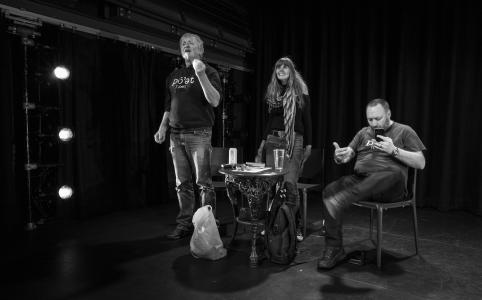
A man comes on stage, carrying a pint. It’s the first time three friends have met in the pub since the pandemic. Steve and Dave are glad to be back but Emma’s still worried about the risks. With reason, as for this performance Dave really was off with Covid, and instead was played by a large stuffed bear. Given that this show was designed as a discussion between three people Steve Pottinger and Emma Purshouse carried the show assuredly, filling in for Dave in the conversation with hardly any hesitations, and reading his poems.
Discussion and poetry ranged over a variety of subjects describing our common experiences in the pandemic. What did we miss most? What did we do? The audience found this hugely relatable, and shows like this are valuable in allowing us to look back and understand that very strange time. Subject matter wasn't confined to pandemic matters. Some poems provided closely observed social comment and there was physical comedy from Emma.
By setting the performance in a pub, with banter flowing between the performers, this show is a relaxed way to appreciate the poems. The method of delivery and subject matter means this is an accessible spoken word performance and would be enjoyed by everybody.
This show won Best Spoken Word Show at Morecambe Fringe in the summer of 2022
Whose Round Is It Anyway? is on again at Underground at the Old Clubhouse on Wednesday 19 July 2.30pm to 3.20pm and it is hoped that Dave will be back.
Georgina Blair
ST NICHOLAS BY CONOR MCPHERSON - Strange Fish Theatre Company

There seems to be a running theme in this year’s Fringe – one-man shows concerning supernatural creatures – and St Nicholas is an excellent edition to this sub-genre.
We meet a dapper man, wearing a suit and carrying a fob watch, who tells us his remarkable story. as one of Ireland’s leading theatre critics, feared and loathed by the profession, and revelling in his power. Then a chance visit to a mediocre play brings him into contact with a young actress who changes the way he looks at the world. Following her to England, and faced with his own shortcomings as a writer, husband, father and man, he is drawn into the orbit of a group of vampires, who make him their servant …
Conor McPherson’s play St Nicholas cleverly uses the themes of vampirism sparingly and with wit and imagination. There is an obvious correlation between the parasitic nature of the critic, living off other people’s efforts, and the vampires, feeding off the blood of hopeful, energetic young people. The most striking way he plays with the lore of vampires is on the subject of reflection. We all know vampires can’t see themselves in a mirror, but these vampires are creatures of instinct, who can’t reflect on themselves. In the same way, it is only when the critic begins to reflect on his own existence that he starts to become alive.
Nick Danan gives a terrific performance, intimate yet declamatory, drawing us fully into his story. This is a character that we are able to relate to, despite his inadequacies as a man, because below his arrogant bluster, we see the insecurities. When he talks about meeting Helen, the young actress, whose purity of talent so enraptures him, we see the tears appear in his eyes, his expression softening as he describes the bones in her feet. It is a fine, detailed performance that captures all the magic of McPherson’s writing.
The workshop space in the Green Man Gallery proves an ideal space for this play, and I hope many more people make their way there to see it.
Robbie Carnegie
THE SEVEN DEADLY GINS - Gekkota Arts

Set in a cocktail bar, The Seven Deadly Gins by Gekkota Arts takes us drink by drink through an inventive anthology of scenes representing the seven deadly sins.
Each scene has been devised by the company and then scripted by Ciaran Lindley, who is on stage throughout as our bartender. He is an authoritative presence and his tasting notes linking the scenes are wry and lyrical and delivered with just the right balance of world-weary sympathy and cynicism.
Louise Humpage is a reliably expressive presence through many of the scenes, in Envy, as an arrogant manager condescending to tell a junior how to get ahead, before getting her comeuppance, and particularly in the second scene on Sloth (unlike the other derived pieces this is written by Katy Dent) as a lazy shop worker alongside Eden James ignoring Ryan Mitchell’s shopper as he is driven to distraction by the self-service machine.
As both the self-service machine, and as the voice of an Alexa-like digital assistant in Wrath, Amy Vinten is excellent at capturing the supercilious but polite voice of machines, perhaps she has a future in voicing satnavs too?
Though some scenes work better than others and the mimed intervals sometimes don’t differentiate the sins enough, it is great to see such a large cast on stage in fringe theatre which is often dominated by monologues and two handers. Without giving too much away the opening and closing of the play which extend the limits of the piece are excellently staged and a lot of fun.
Stephen Walker
I WAS A TEENAGE BISEXUAL - The Off-Off-Off-Broadway Company/Polis Loizou
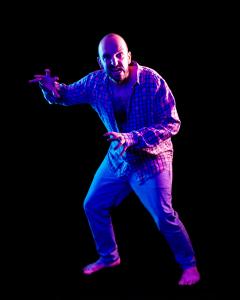
Polis Loisou’s one-man performances have become a mark of quality in Buxton Fringe’s Theatre programme, and this year he returns with his new venture, I Was A Teenage Bisexual.
Drawing on the tropes of 1950s Hollywood B-movies, this monologue begins with the authoritative tones of a radio announcer telling us to be on our guard against that most insidious of threats, a creature who appears to be one thing, but may be something else, the bisexual. Polis cleverly subverts the werewolf myths as we meet Junior, a young man confused as to his identity in a town where people are starting to be brutally murdered. Who’s responsible? And who actually is he?
Polis, in typically self-effacing manner, maintains that this is still a work in progress and it’s true there are a few narrative turns that could be clearer. However, in all other respects this feels like a finished product. Polis Loisou is so good at this kind of monologue, consistently moving from character to character, his physicality relaxed but precise. This is an entertaining show, but also one with a message of identity and acceptance that has a clear resonance.
Robbie Carnegie
(CIRCLE DREAMS AROUND) THE TERRIBLE, TERRIBLE PAST BY SIMON LONGMAN - REC Youth Theatre

'(Circle Dreams Around) The Terrible, Terrible Past by Simon Longman' was one of the new plays created for this year’s National Theatre Connections festival, and for performance by youth companies around the country. The play is an intriguing one – a Dreamer (a quietly focused and observant performance from Emma Garde) is stuck in a circle of dreams, and the audience is taken along in a series of increasingly surreal and grotesque vignettes, many dealing with death and meat (we are introduced to a chicken, a cow, a fish and a butcher).
There is certainly much for the REC Youth Theatre’s Senior Company to get their teeth into, and they clearly enjoy the bizarre nature of the material. The performances lurch from the naturalistic to the way-out and it’s good to see many of its performers growing in confidence.
If I have a reservation it’s that I’d have liked to have seen a bit more variety in the characterization. Also the production often felt quite internalized – a bit more stagecraft and projection would have involved the audience more and left us feeling less like observers. Of the young performers who grasped this more, I enjoyed Elyse Fanthorpe Marling as the Chicken, Sophie Rider as the Cow and Wilf Hornsey Saunders as the Scissor Boy.
There is a lot of potential in this company, and I look forward to seeing it grow.
Robbie Carnegie
TO BE OR NOT TO BE - Buxton Opera House Summer Company

For its work experience scheme this year, Buxton Opera House has come up with a laudable concept – to create a group of young people who will learn what the realities of being in a touring theatre company are like. Not just having the fun of being in a show, but building the set, promoting the production and ultimately touring it around a number of local schools.
The performance in question is To Be Or Not To Be, a pithy, pared-down version of Hamlet which the 20-strong team perform with conviction and economy. The story is the familiar one – Hamlet (Rosie Hall) comes to believe that his father (Nathanael Gaskin) has been murdered by his uncle Claudius (Isaac McElroy), who covets both throne and his brother’s widow, Gertrude (Polly Withall). Tragedy ensues.
What brings this production to life is the fact that the cast works as a true ensemble, constantly focused and disciplined in their movements and intention, especially in its sections of choreographed movement, especially the section featuring the death of Ophelia (an excellent Alice Lumb), where the company become the swirling river, carrying her away to her watery grave.
Many of the young company were new to Shakespearean dialogue, but given how much they've achieved in terms of the physical aspect of the production in under a week, one could only imagine the leaps and bounds they'd make with the verse given another week!
This is a memorable and original production, tied to an admirable purpose as its tour will be used as a focus of workshops around the subjects of responsibility and knife crime. There’s no question that the young people involved will have found this an enriching experience.
Although it is appearing at a number of schools, it only has one more Fringe performance – at the Leewood Hotel on 14 July. Catch it while you can.
Robbie Carnegie
LOST AND FOUND - Breathe Out Theatre

Founded by Manchester based writer and producer Rob Johnston, Breathe Out Theatre is an award winning, non-profit company. A collective talent performs new writings, alongside rarely performed plays by established writers.
The scene is set for us down on the riverbank, amongst the crumpled beer cans, on a day when “whatever you are looking for will bite when you’re ready”. It’s turf wars as loner, Pam Ayers reciting Grandma and her sleeping baby granddaughter have their fishing tranquillity rudely disturbed by an over-enthusiast metal detectorist, intent on unearthing lost treasure.
After a tetchy start an unlikely friendship begins to blossom with heated debates about gravity, shared boiled sweets well past their sell by date, and dancing to the theme of The Great Escape. The latter sparks a moment of clarity when Grandma realises that they are “old enough to know that there is no ‘great escape’”.
Preferring to keep herself to herself Grandma enjoys the contemplative quiet of the river rather than the actual catch after carrying the emotional scars of a lifechanging encounter as a 17 year old.
With sights previously set on Dragon’s Den after a lifetime’s work of dodgy inventions, time is running out for our entrepreneur detectorist who desperately needs to find his final one big idea before it’s too late.
Secrets are shared and shocking revelations are made. Lies have been told, and good deeds have had devastating consequences. Can this chance encounter be life-changing for both of them?
With wonderful acting throughout, this 2-person production grabs your attention from the get go. It is the perfect blend of emotional rollercoaster; warm, funny, reflective, and sad. It will keep you hooked until the very end (sorry I couldn’t resist a fishing pun). Not to be missed!
Please note this play is a 70 minute performance, not 60 as advertised.
Karen Wain-Pimlott
MURMURATION - Steve Vertigo

Murmuration starts with an empty stage, save for a laptop and a large screen showing an avatar of Steve Vertigo. Is this a glimpse into the future of live entertainment as created by ChatGPT? Fortunately Steve Vertigo leaps on to the stage assuring us that he’s the real Steve before giving us a guided tour of the tech in his home. And Steve does like his tech. Steve’s deadpan delivery as he described the benefits of having a smartwatch had the audience giggling, and then glancing dubiously at their own smart wearables.
Events take a surreal turn as Steve describes his experiences in the Murmuration, which explains why he’s wearing those feathers. Reminiscent of The Mighty Boosh, there is a serious question amongst the strangeness. What sort of world is our use of AI in daily life leading us to? And unfortunately for Steve, he misunderstands his relationship with his home tech, with disastrous consequences.
This show comes to Buxton Fringe after a recent successful run at Brighton Fringe, and is particularly timely given the current news headlines about AI (that’s ‘Artificial Intelligence’). Steve Vertigo is a former lecturer on computer game design so he knows his tech. He’s now a stand-up comedian, and knows how to make you laugh. Murmuration is fantastic value - it’s an amusing way to spend an hour, and leaves you with lots to think about afterwards.
Whip out your smartphone and book for one of the two remaining performances for Murmuration at Underground at the Old Clubhouse, on 7 July (1pm to 1:50pm) and 8 July (5:30pm to 6:20pm).
Georgina Blair
WHAT IF BY PATRICIA DOWNEY - Spanner In The Works Theatre Company
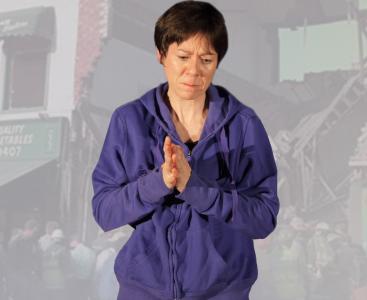
For the last couple of years, Spanner in the Works Theatre have wowed Buxton Fringe audiences with their emotionally truthful depictions of life, enlivened by Patricia Downey’s insightful writing. Their latest production looks set to do the same.
In Downey’s latest play, What If, we meet Gina, looking forward to Christmas with her two children, and Gary, her Jack-the-lad son anticipating a night on the town. Both of their lives will soon be torn apart as Gina’s daughter – and Gary’s sister – Leeanne is suddenly taken from them in the most violent and arbitrary manner imaginable, as she is a victim of the 1993 Shankill Road bombing. The play then turns into an examination of the grief of these two characters as they struggle to cope with their loss.
Actors Colette Hart and Neil Heaney deliver performances of raw intensity, laying their emotions bare on stage, so that the audience completely understands Gina’s descent into medicated oblivion, and Gary’s drifting into crime.
What If is delivered as a series of monologues and, if I’m being picky, I’d have liked the characters to come together at some point, maybe to share their ultimate redemption. But there is no doubt that this is a careful, touching piece of theatre that, as ever with Downey’s work, is admirable in its honesty and emotional heft.
Robbie Carnegie
REVENANT - Devils & Dust
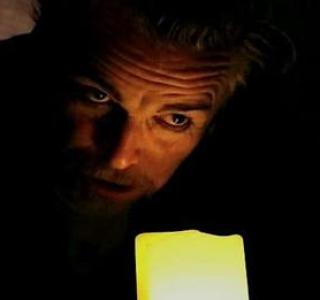
Carter is a down-on-his-luck film director, forced to scrape the bottom of the barrel artistically to make a low-budget horror film on a remote Irish island. What’s more, he’s lost his star, and at the last minute has to take on a new leading man, a charismatic old-school actor known only as Vardell.
This is the set up for Revenant, a gripping one-man play in which Patrick O’Donnell plays Carter, telling the story of the making of the film and the increasingly bizarre and scary events that unfold. Simply staged, Revenant stands or falls on O’Donnell’s abilities as an actor and storyteller, and he admirably acquits himself, attacking the piece with energy and verve, mining it both for spooky atmosphere and quickfire comedy. Carter is a very well-drawn character, a recognizable Hollywood type, of the manic misunderstood artist, while Vardell’s langorous, fruity delivery creates hints of a sinister Richard E Grant. His characters are brought to life with economy and precision, whether through the rat-a-tat dialogue or O’Donnell’s expressive features.
In a sense, it could be argued that Revenant holds few surprises in terms of its plot – it leans heavily into the tropes of vampire films and the like – but its strength lies in its riveting central performance, making it a highly entertaining piece of storytelling theatre.
Robbie Carnegie
THE ENFIELD POLTERGEIST - Act284
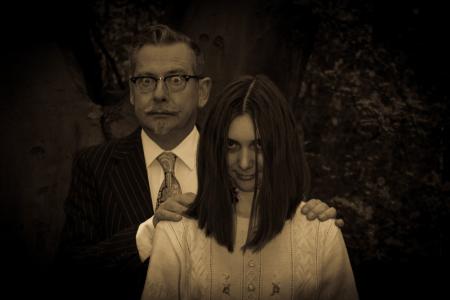
If you enjoy a good ghost story you could do worse than this new version of The Enfield Poltergeist by ‘Act284’ which is based upon true events in 1977.
The intriguing plot begins with the death of Maurice Gosse’s 22 year old daughter, Janet, on her birthday following a motorcycle crash. There were many premonitions around the incident, notably a birthday card sent a few hours earlier to Janet from her brother with a cartoon of a bandaged head – identical to the bandages worn on the head of Janet while she survived for 12 hours after the accident in hospital.
There were other "coincidences” which prompted Maurice to join the Society for Psychical Research which eventually sends him to Enfield to investigate paranormal activities. This is where he meets the daughter of the house: Janet Hodgson.
Thus begin the parallels of the story of the two Janets. The dual plots are cleverly inter weaved and Paul Voodini shows considerable emotion at the loss of his Janet. Keira Rhodes manages well with the dual roles of the two Janets clearly differentiating between the two characters. Without giving spoilers; doubts arise toward the end of the play and it is left to the audience to form its own conclusions.
It was interesting to watch a ghost story not in a cliché Gothic setting, even though it was a sunny Buxton afternoon outside.
A capable and entertaining show.
Further performances: 6th and 7th July.
Brian Kirman
BESIDE MYSELF - On The Spot Theatre Company, Chicago, IL USA

During the Lockdown years, many theatre companies found new ways of plying their trade. Central to this was the phenomenon of the Zoom reading, and Chicago’s On The Spot Theatre Company have taken that concept and run with it as a fully realized production, in their premiere of Mike Brayndick’s comedy, Beside Myself.
When neurotic biographer Douglas (Baird Brutscher) feels there is something missing in his life and relationships, he comes to believe that he has a doppelganger, a twin, who inherited all the character traits that he lacks. Douglas becomes increasingly fixated with this idea, to the point where the doppelganger appears to him, causing him to distance himself further from his wife, daughter, mother and best friend.
The play feels like a cross between a Woody Allen-style comedy and the James Stewart classic, Harvey, where the central character is accompanied by someone who no one else can see. It throws in plenty of introspection and psychobabble, alongside references to popular literary figures such as PG Wodehouse and Maeve Binchy, as Douglas embarks on a journey of self-discovery, ultimately coming to the realization of how the relationships he felt were lacking were there all along.
The Zoom format is a useful tool to bring this play to a wider audience, and On The Spot use it well, with some consistent use of backdrops, sound effects etc. However, it also has its limitations, in terms of characters’ eyelines and – the eternal bane of a Zoom call – the impossibility of ensemble singing. In some respects Beside Myself could have worked just as well as a radio play, but this production embraces its medium. The play will remain on YouTube meaning it can be enjoyed during the Fringe and beyond.
Robbie Carnegie



